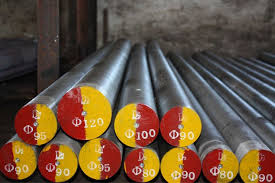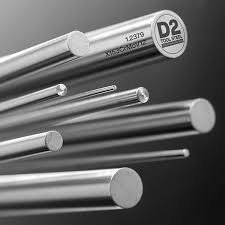Welcome to My Blog!
Before we dive into the content, I’d love for you to join me on my social media platforms where I share more insights, engage with the community, and post updates. Here’s how you can connect with me:
Facebook:https://www.facebook.com/profile.php?id=100085401406977
LinkedIn:https://www.linkedin.com/showcase/102680001/admin/dashboard/
Now, let’s get started on our journey together. I hope you find the content here insightful, engaging, and valuable.
Introduction

In the world of manufacturing, selecting the right material is crucial for producing high-quality, durable tools and components. One material that has gained significant attention is Qilu D2 tool steel. Renowned for its exceptional hardness, wear resistance, and overall performance, Qilu D2 tool steel is a preferred choice for various industrial applications. This blog delves into the advantages of using Qilu D2 tool steel, exploring its properties, benefits, and applications in manufacturing.
What Is Qilu D2 Tool Steel?
Qilu D2 tool steel is a high-carbon, high-chromium alloy tool steel that is known for its outstanding hardness and wear resistance. Manufactured by Qilu Steel, this steel grade is designed to offer exceptional performance in tools and dies that require high strength and durability. It is commonly used in applications where resistance to abrasion and deformation is crucial.
Key Properties of Qilu D2 Tool Steel
- High Hardness: Achieves a Rockwell hardness of approximately 60-62 HRC.
- Excellent Wear Resistance: Resists abrasion and wear, making it ideal for cutting and forming tools.
- Good Toughness: Maintains its toughness and impact resistance under high stress.
- High Chromium Content: Enhances corrosion resistance and stability at high temperatures.
Benefits of Using Qilu D2 Tool Steel
Choosing D2 tool steel for manufacturing offers several advantages that make it a superior material for various applications. Here’s how it stands out:
Exceptional Wear Resistance
Qilu D2 tool steel’s high chromium content provides superior wear resistance. This makes it ideal for applications involving high friction and abrasion, such as cutting tools, dies, and stamping components. Its ability to maintain sharp edges and resist surface degradation extends the lifespan of tools and reduces maintenance needs.
High Hardness and Strength
With a Rockwell hardness of 60-62 HRC, D2 tool steel is extremely hard and capable of withstanding significant mechanical stress. This hardness is crucial for tools that need to retain their shape and cutting edges under rigorous use, ensuring reliable performance and longevity.
Improved Dimensional Stability
The high chromium content in Qilu D2 tool steel contributes to its dimensional stability. This property ensures that the steel maintains its shape and size even under fluctuating temperatures and stress, making it ideal for precision manufacturing applications.
Good Toughness
Despite its high hardness, Qilu D2 tool steel offers good toughness, which helps prevent cracking and chipping under impact. This balance of hardness and toughness makes it suitable for applications where both properties are required.
Enhanced Corrosion Resistance
The chromium content in Qilu D2 tool steel also provides improved corrosion resistance compared to other tool steels. This feature is particularly beneficial in environments where exposure to moisture and corrosive elements is a concern.
Applications of Qilu D2 Tool Steel
Qilu D2 tool steel is widely used in various manufacturing applications due to its advantageous properties. Here are some common applications:
Cutting Tools
Qilu D2 tool steel is extensively used for manufacturing cutting tools such as knives, shear blades, and drill bits. Its hardness and wear resistance make it ideal for tools that need to maintain sharp edges over prolonged use.
Dies and Punches
The steel’s wear resistance and toughness make it suitable for dies and punches used in stamping, molding, and extrusion processes. D2 tool steel ensures that these tools can withstand repeated impacts and high stresses without deforming.
Molds
In the production of plastic and metal molds, D2 tool steel is used due to its ability to maintain dimensional accuracy and resist wear. This results in high-quality molded products and extended mold life.
Forming Tools
Forming tools, such as those used in pressing and bending operations, benefit from the high hardness and wear resistance of Qilu D2 tool steel. It ensures that these tools perform effectively under heavy use.
Industrial Machinery Components
Qilu D2 tool steel is also used for various components in industrial machinery where high strength and wear resistance are required. These components include gears, shafts, and bearings.
Comparing Qilu D2 Tool Steel to Other Tool Steels
When choosing tool steel for specific applications, it’s helpful to compare different types of tool steels to understand their relative advantages. Below is a comparison of D2 tool steel with other common tool steels:
Tool Steel Comparison
| Property | Qilu D2 Tool Steel | A2 Tool Steel | O1 Tool Steel | S7 Tool Steel |
|---|---|---|---|---|
| Hardness | 60-62 HRC | 57-59 HRC | 55-60 HRC | 57-59 HRC |
| Wear Resistance | Excellent | Good | Fair | Good |
| Toughness | Good | Good | Fair | Excellent |
| Corrosion Resistance | Good | Fair | Poor | Fair |
| Dimensional Stability | Excellent | Good | Good | Fair |
| Applications | Cutting tools, dies, molds | Dies, punches, molds | General tooling | Impact tools, dies |
Maintenance and Care for Tools Made from Qilu D2 Tool Steel

Proper maintenance is crucial to maximize the lifespan and performance of tools made from D2 tool steel. Here are some key maintenance tips:
Regular Inspection
Inspect tools regularly for signs of wear, cracks, or damage. Early detection of issues allows for timely repairs or replacements, preventing further damage.
Proper Cleaning
Keep tools clean to prevent corrosion and maintain their performance. Use appropriate cleaning agents and techniques based on the type of tool and its exposure to various substances.
Sharpening
Maintain the sharpness of cutting tools by regularly sharpening them. This ensures optimal performance and reduces the risk of tool failure.
Lubrication
Apply lubrication to moving parts to reduce friction and wear. Proper lubrication helps maintain the tool’s efficiency and longevity.
Storage
Store tools in a dry, controlled environment to prevent corrosion and damage. Use protective coatings if necessary to extend their service life.
Conclusion
Qilu D2 tool steel is a superior material for manufacturing due to its exceptional hardness, wear resistance, and overall performance. Its properties make it an ideal choice for cutting tools, dies, molds, and other components that require high strength and durability. By understanding its benefits, applications, and maintenance requirements, manufacturers can leverage Qilu D2 tool steel to produce high-quality, reliable tools and components that stand up to rigorous demands.
FAQ
What is Qilu D2 tool steel, and why is it preferred in manufacturing?
Qilu D2 tool steel is a high-carbon, high-chromium alloy tool steel known for its hardness, wear resistance, and toughness. It is preferred for manufacturing due to its ability to withstand high stress, maintain sharp edges, and resist abrasion.
How does D2 tool steel compare to other tool steels?
D2 tool steel offers excellent hardness and wear resistance compared to many other tool steels. It has better corrosion resistance and dimensional stability than some alternatives, though it may be less tough than other types like S7.
What are the common applications of Qilu D2 tool steel?
Common applications include cutting tools, dies, molds, forming tools, and industrial machinery components. Its properties make it suitable for any application requiring high strength and durability.
How should tools made from Qilu D2 tool steel be maintained?
Tools should be regularly inspected for wear, cleaned to prevent corrosion, sharpened to maintain performance, lubricated to reduce friction, and stored properly to extend their lifespan.
Can Qilu D2 tool steel be used in high-temperature applications?
Qilu D2 tool steel performs well at high temperatures due to its chromium content, which enhances its stability. However, for extremely high temperatures, additional considerations and alternative materials may be required.
